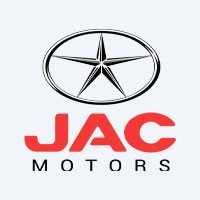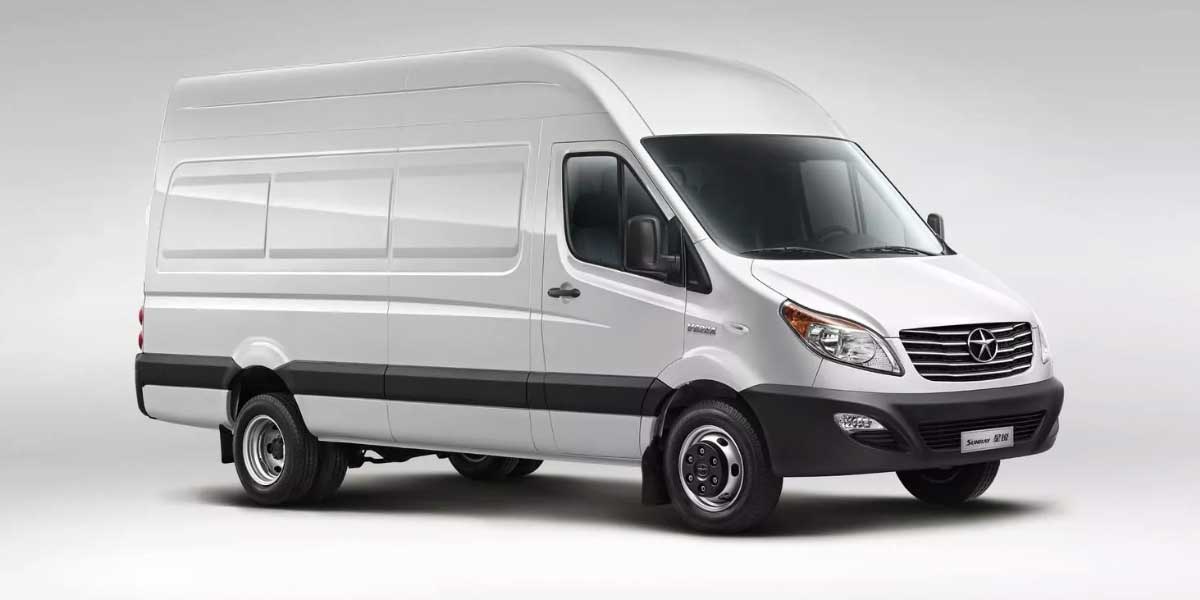JAC Sunray EV
The JAC Sunray EV, tailored for entrepreneurs, offers a range of 230 km and a max speed of 100 km/h. Powered by a 77 kWh battery, this RWD van boasts a 150 hp engine. With a spacious cargo capacity of 1575 kg and a starting price of $34,300, it combines productivity and affordability.
User Rating: 4 / 5 (43 votes)





Base Trim Price: $34300 USD *
| truck type | delivery van |
| manufactured in | China |
| model year | 2024 |
| range (km) | 230 |
| speed (km/h) | 100 |
| power (hp) | 150 |
| battery (kWh) | 77 |
| cargo capacity (kg) | 1575 |
| drive type | RWD |
* Minimum price set for the base trim by the manufacturer

Exterior and Interior photos of JAC Sunray EV
JAC Sunray EV Review
All About the JAC Sunray EV
The JAC Sunray EV is a remarkable choice for those in the commercial sector, focusing on the practical blend of reliability and affordability. Manufactured in China, with sales beginning in 2024, this electric vehicle is engineered to meet the demands of various business applications. Competitively priced at $34,300, it stands as an economically viable option compared to its contemporaries.
Engine and Power
Under the hood, the JAC Sunray EV is powered by a 150 horsepower (112 kW) engine, delivering robust performance suitable for commercial needs. With a rear-wheel drive (RWD) system, it offers steady traction and control, particularly in load-bearing scenarios.
Range and Speed
The vehicle provides a range of 230 kilometers (143 miles) on a full charge, making it a dependable option for urban deliveries and short hauls. It reaches a maximum speed of 100 km/h (62 mph), balancing speed and efficiency perfectly for city commutes and cargo transport.
Battery and Charging
Equipped with a 77 kWh battery, the JAC Sunray EV ensures longevity and durability. Charging infrastructure compatibility is key; it supports standard charging stations, making it convenient to recharge at various points. This battery capacity strikes a harmonious balance between range and payload efficiency.
Interior and Comfort
The van’s interior is meticulously designed to enhance driver comfort and functionality. Leather-trimmed steering and ergonomically designed seats make long drives comfortable. Air conditioning systems manage the climate effectively, ensuring a pleasant cabin atmosphere regardless of external weather conditions.
Safety and Technological Features
Safety is paramount in the JAC Sunray EV. It includes power steering, a driver airbag, and the ERA-GLONASS system for emergency response. For stability and controlled driving, the van incorporates a comprehensive stabilization system. Optional features like climate control, pre-heater for the engine, fog lights, and parking sensors add to the vehicle’s utility and user convenience.
Design and Exterior
The exterior of the JAC Sunray EV bears a sturdy, professional aesthetic with a prominent front grille and streamlined bumper. Halogen optics and side plastic pads enhance both appearance and practicality, providing protection against minor abrasions.
Cargo Capacity and Utility
Flexibility in cargo volume is another standout feature. The van offers customizable cargo space from 7.5 to 12 cubic meters, catering to diverse business needs. With a cargo capacity of 1575 kg, it’s engineered to handle substantial loads efficiently.
Final Thoughts
The JAC Sunray EV is an excellent investment for entrepreneurs seeking a reliable, productive, and eco-friendly commercial vehicle. Its blend of power, range, and customizable features sets it apart in the competitive market of electric commercial vans.
Watch the Video Overview
F.A.Q. about JAC Sunray EV
What is the battery capacity of the JAC Sunray EV?
The JAC Sunray EV comes with a 77 kWh battery, providing ample power for commercial use.
What is the range of the JAC Sunray EV on a single charge?
The range of the JAC Sunray EV is approximately 230 kilometers (143 miles) per charge.
What is the price of the JAC Sunray EV?
The starting price of the JAC Sunray EV is around $34,300.
What is the top speed of the JAC Sunray EV?
The JAC Sunray EV has a maximum speed of 100 km/h (62 mph).
Can the JAC Sunray EV be charged at any charging station?
Yes, the JAC Sunray EV supports standard charging infrastructure, allowing it to be charged at various stations.
Are there government incentives or rebates for purchasing the JAC Sunray EV?
Many regions offer incentives or rebates for electric vehicle purchases. Check local regulations for specific details.
How does the JAC Sunray EV compare in acceleration to other EVs?
The JAC Sunray EV, with its 150 horsepower engine, provides a balanced acceleration suitable for commercial use, competing well against other electric vans in its class.
What are the environmental benefits of the JAC Sunray EV?
The JAC Sunray EV produces zero emissions, contributing to reduced air pollution and a smaller carbon footprint.
What is the lifespan of the JAC Sunray EV's battery?
Electric vehicle batteries, including the JAC Sunray EV's, typically last between 8-15 years, depending on usage and maintenance.
Does the JAC Sunray EV have fewer parts than gasoline vehicles?
Yes, electric vehicles like the JAC Sunray EV generally have fewer moving parts, resulting in potentially lower maintenance costs and fewer mechanical issues.
Comparison:
The JAC Sunray EV finds itself amidst worthy competitors, and it holds its ground ferociously. Let's see how it squares off against the likes of the Mercedes-Benz eSprinter, Ford E-Transit, and Nissan e-NV200. We’re diving into the quintessentials: range, acceleration, power, charging time, and price.
Range
JAC Sunray EV: With a range of 230 km (143 miles), it outpaces its peers for urban and suburban deliveries, making it a formidable contender.
Mercedes-Benz eSprinter: A modest 150 km (93 miles), making it more suitable for shorter hauls within the city.
Ford E-Transit: Offers a respectable 196 km (122 miles), blending robustness with endurance.
Nissan e-NV200: Ensures 200 km (124 miles) of range, balancing performance and practicality for urban usage.
Acceleration
JAC Sunray EV: Its 150 hp keeps it in competitive territory with moderate yet sufficient acceleration for daily commercial loads.
Mercedes-Benz eSprinter: Lags a bit with a 114 hp power output, showing a slightly more relaxed pace.
Ford E-Transit: Packs a punch with its robust 266 hp, offering the zestiest acceleration here.
Nissan e-NV200: Sits at a lower bracket with 107 hp, delivering adequate thrust but staying on the mellower side.
Power
JAC Sunray EV: With 150 hp (112 kW), it strikes a reliable balance for various commercial tasks, solidly mid-pack.
Mercedes-Benz eSprinter: Keeps itself grounded with 114 hp (84 kW), sufficient yet unremarkable in this company.
Ford E-Transit: Dominates the field with its 266 hp (198 kW), designed for rigorous commercial expectations.
Nissan e-NV200: Delivers 107 hp (80 kW), favoring efficiency over brute force but perfectly serviceable.
Charging Time
JAC Sunray EV: Ready in approximately 8 hours using a standard 240V outlet, making overnight charging a breeze.
Mercedes-Benz eSprinter: Comparable with around 6-8 hours, ensuring you're not left hanging.
Ford E-Transit: Speedier on the charge at about 4 hours, ideal for those needing quicker turnaround.
Nissan e-NV200: Efficient in its charging, clocking in at about 6 hours, hitting a sweet spot for commercial use.
Price
JAC Sunray EV: At $34,300 (£26,700, €31,500), it offers a fantastic balance of cost and capability.
Mercedes-Benz eSprinter: Commands a higher price at $50,000 (£38,700, €46,000), reflecting the premium branding.
Ford E-Transit: Mid-tier at $44,500 (£34,500, €41,000), blending advanced tech with solid performance.
Nissan e-NV200: The most wallet-friendly at $30,000 (£23,200, €27,500), emphasizing affordability without sacrificing too much performance.
The JAC Sunray EV not only competes with these seasoned players but positions itself as a pragmatic and attractive option in the commercial EV segment. Its balance of range, power, and price strikes a chord with the discerning entrepreneur looking for reliability without breaking the bank.














